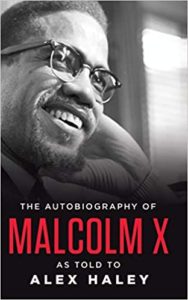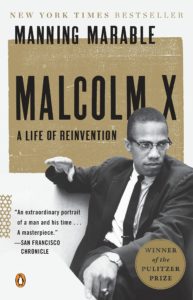Malcolm X was assassinated on February 21, 1965. But Tamim Mobayed argues that the discerning reader should beware of attempts to hijack his legacy, especially by those who are the gatekeepers of his life story.
Malcolm X is claimed by many. Our biases infuse our lenses to the extent that it becomes difficult to objectively assess who Malcolm was without projecting our own inclinations about who we want him to have been.
These biases grow into an inherently different beast when they are enacted within individuals who are gatekeepers and shapers of knowledge about Malcolm. Arguably, the two most significant such individuals are Malcolm’s co-writer on his autobiography, Alex Haley, and from among his biographers, Manning Marable.
Troublingly, both have been accused of distorting Malcolm’s life in an attempt to instrumentalise his legacy to fit their socio-political views.
Alex Haley
There is a growing volume of evidence that Haley took liberties in his role as Malcolm’s co-author. It is noteworthy that Haley disliked the term co-author, as “Co-authoring’ with Malcolm X would, to me [Haley], imply sharing his views – when mine are almost a complete antithesis to his.”
A peculiar statement for a co-author to make, perhaps revealing the seed of Haley’s interference – he was against Malcolm’s views and opportunistically abused his position as a co-author in the aftermath of Malcolm’s assassination to alter their framing and exclude some entirely.
Subscribe to our newsletter and stay updated on the latest news and updates from around the Muslim world!
The ever prophetic Malcolm rhetorically asks Haley during a disagreement about the book’s direction: “Whose book is this?” Answering” “yours of course” at the time, Haley would go on to betray this after Malcolm’s martyrdom.
Haley’s knack for misrepresenting seems to have begun before his work on Malcolm. His second article about the Nation of Islam (NOI), titled “Black Merchants of Hate,” “was significantly tampered with by the FBI,” according to Malcolm’s biographer Manning Marable.
While Marable would conclude that it was Haley’s co-author on that piece that communicated with the Bureau, Marable believed it would be highly unlikely for Haley to not have known of this interference.
Scholar Garrett Felber goes further, also showed Haley to have taken considerable liberties in his writing, citing two instances in which Haley’s writings from 1961, on characters wholly unrelated to Malcolm X, seemingly then were deployed by Haley as the voice of Malcolm. Felber would term this Haley’s “narrative ventriloquism.”
These examples might be dismissed as mere shortcomings of a writer, devoid of any ideological intent. But evidence of the latter is forthcoming. Felber believes that FBI-led changes to the “Black Merchants of Hate” piece were designed to sow divisions within the Nation Of Islam by peppering it with “seeds of sedition” specifically designed to target Malcolm by wrongly framing him as Elijah Muhammad’s successor.
According to NOI Doctrine, succession was due to Elijah’s son. Such insinuations would be among the reasons Malcolm was ultimately driven from the NOI.
Another accusation by Felber sees Haley’s own political views shape the discourse. Indeed, both Felber and Marable quote Haley’s letter to an editor in which he writes of the need, in relation to the autobiography, for “successive rewritings, distilling, aligning, [and] balancing” of the text”…to get it right.” This evokes the reply: to get what right and for whom?
The bluntest and most destructive instrument wielded by Haley came by way of removing three chapters to Malcolm’s autobiography outright, titled “The Negro, The End of Christianity and Twenty Million Black Muslims.” Marable writes that this decision “may have been Haley’s alone.”
These chapters were believed to contain a distillation of Malcolm’s most recent religio-political visions, including a particular emphasis on the future of African-Americans and a new alignment towards Islam. This move represents but one attempt to minimise the significance of Malcolm’s final year of life, in which his political vision was at its most international, inclusive and radical, while his adoption of Sunni orthodoxy began maturing.
Certainly it is this period of his life that could be most instructive for Muslims today.
Another prominent example of this move to diminish the significance of the last year of Malcolm’s life comes by way of Spike Lee’s famed biopic, a critique made by Peter Bailey, one of Malcolm’s men at the Organization of Afro-American Unity.
Manning Marable
Manning Marable’s Pulitzer Prize winning biography of Malcolm was lauded by mainstream literary critics and brought commercial success, yet was attacked by many, including significant individuals who had been close to Malcolm.
Journalist Herb Boyd states that the book contains as many as 25 factual errors. More than a dozen thinkers, writers, historians, and personal friends of Malcolm collaborated on the text “A Lie of Reinvention” critiquing Marable’s work (their title is a play on Marable’s “A Life of Reinvention”).
Similar to Haley, Manning is accused of shaping Malcolm’s vast vision into his own political positions. Where Haley wanted to portray Malcolm as an integrationist (according to Marable), or a manifestation of the American Dream in the form an American “go-getter” (according to Felber), Marable attempts to mould Malcolm into a social democrat.
In the words of historian Christopher Stain: “Marable’s Malcolm sometimes seems more interested in reform than revolution.” Once Poet Laurette of New Jersey, Amiri Baraka, also sees Marable’s politics infusing his treatment of Malcolm.
Perhaps most disconcerting about Marable’s reinvention is the inclusion of a number of salacious allegations about Malcolm’s life. One of these allegations rests on an FBI document.
A few moods are evoked in relation to these allegations – Sundiata Cha-Jua, one of the authors from a Lie of Reinvention, describes them as peripheral and misguided. Another contributor, William W. Sales, sees Marable’s treatment of Malcolm as more pointed, likening it to the FBI’s dragging of Martin Luther King through the proverbial mud.
There is a view among some of those who were closest to Malcolm that Marable’s book was an attempt to endear him to White academic circles. There seems to be consensus amongst critics of Marable that the attention he paid to Malcolm’s private life was “salacious and extraneous.” Strain observes that amongst the most agreed on criticism of Marable’s work from amongst the many detractors is his reliance on speculation.
It is noteworthy that among the FBI’s stated goals within their COINTELPRO program was the discrediting of civil rights leaders, and among their stated means was falsifying information about individuals and groups and having that spread amongst their followers and the general public. In light of this reality, Marable’s decision to include such an allegation from the FBI without explicitly flagging the possibility of it being part of a system of constructive deceit is questionable.
Nevertheless, Malcolm’s status as a champion of his peoples and an icon for self-transformation and struggle grows with time.
The majority of people receive their information about him through his multimillion selling autobiography, and the more recent New York Time’s bestselling biography from Marable.
Significant questions have been posed about both of these texts, and the degree to which the individual views of their writers came to obstruct certain aspects of Malcolm’s life and vision. Awareness of these obstructions is critical, while the need for re-examinations of Malcolm’s life, particularly from a Muslim and Islamic lens, is unrelenting.




















